|
|
|
Sort Order |
|
|
|
Items / Page
|
|
|
|
|
|
|
| Srl | Item |
| 1 |
ID:
171579
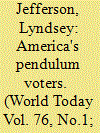

|
|
|
| 2 |
ID:
067395


|
|
|
| 3 |
ID:
098217
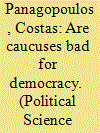

|
|
|
| 4 |
ID:
121125
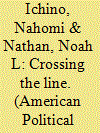

|
|
|
|
|
| Publication |
2013.
|
| Summary/Abstract |
Theories of instrumental ethnic voting in new democracies propose that voters support co-ethnic politicians because they expect politicians to favor their co-ethnics once in office. But many goods that politicians deliver to voters are locally nonexcludable in rural areas, so the local presence of an ethnic group associated with a politician should affect a rural voter's assessment of how likely she is to benefit from that politician's election. Using geocoded polling-station-level election results alongside survey data from Ghana, we show that otherwise similar voters are less likely to vote for the party of their own ethnic group, and more likely to support a party associated with another group, when the local ethnic geography favors the other group. This result helps account for the imperfect correlation between ethnicity and vote choice in African democracies. More generally, this demonstrates how local community and geographic contexts can modify the information conveyed by ethnicity and influence voter behavior.
|
|
|
|
|
|
|
|
|
|
|
|
|
|
|
|
| 5 |
ID:
154994
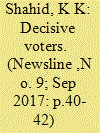

|
|
|
| 6 |
ID:
090612
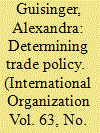

|
|
|
| 7 |
ID:
182041
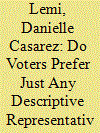

|
|
|
|
|
| Summary/Abstract |
Although scholars of representation have examined variation in voter support conditional on shared demographic traits, we know little about how voters respond to candidates who belong to multiple racial categories. Multiracial candidates challenge how we think about and study representation. I theorize that multiracial categories provide mixed information about how well a candidate adheres to group norms of identity, resulting in a multiracial advantage across groups, but a disadvantage within groups. A conjoint survey experiment on 786 White, Black, Asian, and Hispanic voters and a separate analysis of support for a multiracial candidate in a real-world election support these claims. Thus, multiracial candidates have the advantage of building coalitions with voters from other groups, but they are disadvantaged when appealing to co-racials with strong racial identities. These findings demonstrate that future research on representation must engage multiracial elites.
|
|
|
|
|
|
|
|
|
|
|
|
|
|
|
|
| 8 |
ID:
131673


|
|
|
| 9 |
ID:
173240
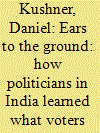

|
|
|
|
|
| Summary/Abstract |
How do politicians learn what their voters want? This article explores how Indian politicians leverage different types of interlocutors in order to develop coherent perspectives of voter wants to support policy and strategy development. It then uses innovative archival data to demonstrate how access to different types of interlocutors made key political developments possible.
|
|
|
|
|
|
|
|
|
|
|
|
|
|
|
|
| 10 |
ID:
090250
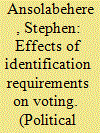

|
|
|
|
|
| Publication |
2009.
|
| Summary/Abstract |
At the heart of the efforts to improve elections in the United States are two important values: access and integrity. To guarantee the right to vote, the polls must be accessible to all who wish to vote. To guarantee legitimate elections, only eligible people should be allowed to vote, and all votes must be tabulated correctly. These values have different implications for administrative procedures, ranging from the implementation of registration systems to the choice of voting equipment to the set up of polling places and training of poll workers. Often these values work hand in hand, but at times they are at odds. Such is the case with the authentication of voters at the polls (see National Commission on Federal Election Reform 2002).
|
|
|
|
|
|
|
|
|
|
|
|
|
|
|
|
| 11 |
ID:
132037
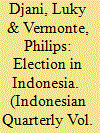

|
|
|
| 12 |
ID:
121091
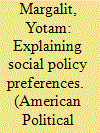

|
|
|
|
|
| Publication |
2013.
|
| Summary/Abstract |
To what extent do personal circumstances, as compared to ideological dispositions, drive voters' preferences on welfare policy? Addressing this question is difficult because a person's ideological position can be an outcome of material interest rather than an independent source of preferences. The article deals with this empirical challenge using an original panel study carried out over four years, tracking the labor market experiences and the political attitudes of a national sample of Americans before and after the eruption of the financial crisis. The analysis shows that the personal experience of economic hardship, particularly the loss of a job, had a major effect on increasing support for welfare spending. This effect was appreciably larger among Republicans than among Democrats, a result that was not simply due to a "ceiling effect." However the large attitudinal shift was short lived, dissipating as individuals' employment situations improved. The results indicate that the personal experience of an economic shock has a sizable, yet overall transient effect on voters' social policy preferences.
|
|
|
|
|
|
|
|
|
|
|
|
|
|
|
|
| 13 |
ID:
149669
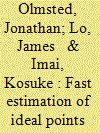

|
|
|
|
|
| Summary/Abstract |
Estimation of ideological positions among voters, legislators, and other actors is central to many subfields of political science. Recent applications include large data sets of various types including roll calls, surveys, and textual and social media data. To overcome the resulting computational challenges, we propose fast estimation methods for ideal points with massive data. We derive the expectation-maximization (EM) algorithms to estimate the standard ideal point model with binary, ordinal, and continuous outcome variables. We then extend this methodology to dynamic and hierarchical ideal point models by developing variational EM algorithms for approximate inference. We demonstrate the computational efficiency and scalability of our methodology through a variety of real and simulated data. In cases where a standard Markov chain Monte Carlo algorithm would require several days to compute ideal points, the proposed algorithm can produce essentially identical estimates within minutes. Open-source software is available for implementing the proposed methods.
|
|
|
|
|
|
|
|
|
|
|
|
|
|
|
|
| 14 |
ID:
131667
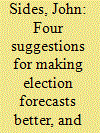

|
|
|
| 15 |
ID:
121908
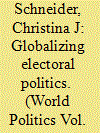

|
|
|
|
|
| Publication |
2013.
|
| Summary/Abstract |
This article analyzes electoral cycles in distributional bargaining in the European Union. The author argues that governments attempt to increase their EU membership benefits above average levels in the preelection period, hoping to appear politically competent to voters. The theory discusses when and how EU members can increase these gains before elections through negotiations in the Council of Ministers. A time-series cross-sectional analysis of EU member states' annual budget negotiations from 1977 to 2006 supports the existence of conditional electoral cycles in distributional bargaining and generally points to the importance of accounting for such cycles when analyzing patterns of international cooperation.
|
|
|
|
|
|
|
|
|
|
|
|
|
|
|
|
| 16 |
ID:
086766
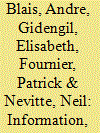

|
|
|
|
|
| Publication |
2009.
|
| Summary/Abstract |
This article assesses the aggregate effect of information shortfall on the outcome of the last six Canadian elections. Building on Bartels' analysis, the authors find an information effect in three of the six elections examined, and in each case the information gap benefits the Liberal Party. That finding raises the question: why does information matter in some contexts but not in others? It is argued in this article that the information gap is related to lack of visibility. When and where all political parties have some degree of visibility, the less informed vote like the better informed, but when and where a party is hardly visible, the less informed are less likely to support that party. The less informed appear to consider a smaller set of options when they decide how to vote.
|
|
|
|
|
|
|
|
|
|
|
|
|
|
|
|
| 17 |
ID:
180265
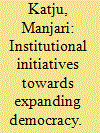

|
|
|
|
|
| Summary/Abstract |
The Election Commission of India (henceforth, the EC), an institution created by the Constitution of India in 1950, manages and conducts parliamentary and state assembly (provincial level) elections. In recent elections, it has made tremendous efforts to make the electoral process more participatory. More than 900 million people were eligible to vote in the Indian parliamentary elections of 2019. In addition to the conventional ways of spreading voter awareness, the EC tried to reach out to voters through previously untried means to persuade them to come to the polling booths and vote – reflecting an institutional enthusiasm for popular mobilisation. However, there are also a significant number of missing names from the electoral rolls, and the EC faces accusations of being apathetic towards this anomaly. Is this eagerness on one hand and anomaly on the other symptomatic of ‘democracy at crossroads’, with India transiting to a more efficacious and involved institutional functioning, or is this an instance of strained institutional performance in the face of rising popular aspirations and tighter executive controls? The paper tries to explore this theme by looking at the functioning of the EC and its efforts towards voter participation in India.
|
|
|
|
|
|
|
|
|
|
|
|
|
|
|
|
| 18 |
ID:
133945
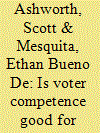

|
|
|
|
|
| Publication |
2014.
|
| Summary/Abstract |
A long research tradition in behavioral political science evaluates the performance of democracy by examining voter competence. This literature got its start arguing that voters' lack of information undermines a defense of democracy rooted in electoral accountability. A more recent literature deepens the debate, with some authors claiming that voters effectively use cues to substitute for information about candidates and policies, and other authors claiming that voters are insufficiently rational to do so. We argue that, regardless of its conclusions about voter competence, this literature's single-minded focus on voter behavior is misguided. We use a sequence of formal models to show that traditional intuitions are incomplete because they ignore the effect that changes in voter behavior have on the equilibrium behavior of politicians. When this strategic interaction is taken into account, increases in voter information or voter rationality sometimes make democratic performance better and sometimes make democratic performance worse. One simply cannot assess the implications of voter characteristics for democratic performance without also studying how those characteristics affect the behavior of politicians.
|
|
|
|
|
|
|
|
|
|
|
|
|
|
|
|
| 19 |
ID:
167163
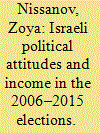

|
|
|
|
|
| Summary/Abstract |
It is commonly assumed that in Israel, higher income groups tend to hold more liberal views and vote for center-left parties while poorer segments of the population support rightwing parties. This article analyzes political attitudes and voting in four parliamentary elections by income groups, using the European Social Survey (ESS) data. By relying on transition matrices and mobility analysis, the article examines which income group is more loyal to the parties and political blocs. The results suggest that the percentage of rightwing voters within all classes is higher than that of leftwing voters. In addition, the poorest individuals are the most loyal voters while the richest are the most likely to switch parties and blocs. Finally, logit estimation shows that rightwing and ultra-orthodox voters are more likely to remain loyal to parties.
|
|
|
|
|
|
|
|
|
|
|
|
|
|
|
|
| 20 |
ID:
126347
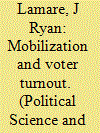

|
|
|
|
|
| Publication |
2013.
|
| Summary/Abstract |
This article melds a well-studied area of research (political mobilization effects on voter turnout) with a subject rarely discussed in political science (the effects of meteorological variability on mood, productivity, and fatigue) to argue that weather at the time of mobilization influences individual voters' turnout odds relative to other contacted voters. Using panel data totaling 39,769 registered voters contacted by unions across 14 months and five elections, quantitative analysis is used to measure the effects of temperature, seasonableness, and precipitation during contact on vote likelihood, controlling for known turnout influences. Results indicate that variations in all three weather conditions during contact affect vote odds. Mobilization effects are weaker as temperatures rise and weather becomes unseasonably hot; mobilization is also less successful as precipitation increases. Outcomes vary by contact type; door-to-door visits are more negatively influenced by hotter and less seasonable temperatures, whereas phone calls are more negatively affected by higher precipitation.
|
|
|
|
|
|
|
|
|
|
|
|
|
|
|
|
|
|
|
|
|